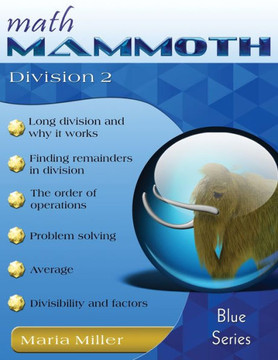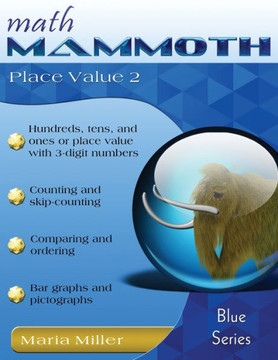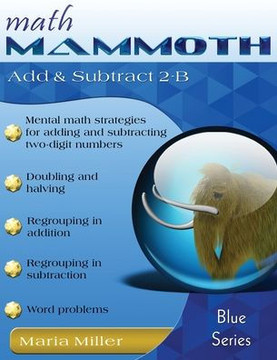
Math Mammoth
Math Mammoth Multiplication 2
Product Code:
9781954358713
ISBN13:
9781954358713
Condition:
New
$17.25
$16.30
Sale 6%

Math Mammoth Multiplication 2
$17.25
$16.30
Sale 6%
Math Mammoth Multiplication 2 is a worktext focusing on multi-digit multiplication and related topics. It best suits fourth grade mathematics. The first lessons briefly review the concept of multiplication and the multiplication tables. Next, students encounter equations in disguise - presented with shapes on both sides of a pan balance - in the lesson Scales Puzzles. This lesson is intended to be fun and motivational. Then, the focus shifts to multi-digit multiplication (also called multiplication algorithm or multiplying in columns). We start out by learning to multiply numbers by multiples of ten and hundred (for example, 20 × 4 or 500 × 6). After this is mastered, students learn the very important concept of multiplying in parts, or partial products. This means that, for example, we multiply 4 × 63 in two parts: first we multiply 4 × 60 = 240 and 4 × 3 = 12, and lastly the results are added: 240 12 = 252. This principle underlies all other multiplication algorithms, so it is important to master. We don't want children to "blindly" memorize the multiplication algorithm without understanding what is going on with it. The partial products algorithm (multiplying in parts) also ties in with an area model, and it is very important that students see the connection between this visual model and the procedure. The book contains two lessons about multiplying in columns the "easy way". This "easy way" is a simplified form of the traditional multiplication algorithm, based on partial products. You may skip these two lessons at your discretion. The method taught in those lessons is most useful for students who may have trouble with the traditional form of the algorithm. This method is also helpful in cementing the student's understanding of the partial products method. The traditional, or standard, form of multiplication algorithm is taught next, and is hopefully fairly easy, with the partial products as a foundation. Students also study estimation, the order of operations, and multiplying with money. There are numerous word problems in all of the lessons. Students are encouraged to write number sentences for the word problems-essentially learning to show their work and their thinking process. The lesson So Many of the Same Thing has to do with proportional reasoning. The idea is really simple, and prepares students for learning ratios and proportions in middle school. The last major topic in the book is multiplying two-digit numbers by two-digit numbers. Again, we first study partial products and tie that in with an area model. The lesson Multiplying in Parts: Another Way is optional. Lastly, the book teaches the standard algorithm for two-digit by two-digit multiplication. Students will practice multiplication with more digits in the book Mammoth Multiplication & Division 3.
| Author: Maria Miller |
| Publisher: Math Mammoth |
| Publication Date: Apr 24, 2024 |
| Number of Pages: NA pages |
| Language: English |
| Binding: Paperback |
| ISBN-10: 1954358717 |
| ISBN-13: 9781954358713 |





